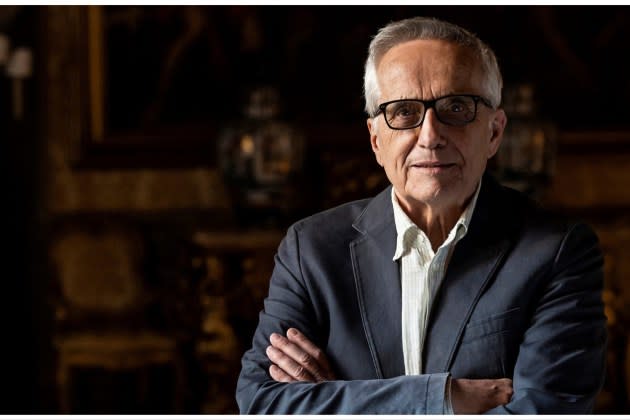Marco Bellocchio Talks Controversies, Feud With Luis Buñuel Over ‘Fists in the Pocket’

Marco Bellocchio has ruffled some feathers over the years – starting with his feature debut “Fists in the Pocket.”
“I do remember that people were shocked about me making a film, in Italy, about a son killing his mother. They were surprised and I don’t know why. I thought it was a good idea – from a dramatic point of view,” he said at International Film Festival Rotterdam during a talk with festival director Vanja Kaludjercic.
More from Variety
While his colleague Bernardo Bertolucci found himself in even bigger trouble – “They wanted to burn the negative of ‘The Last Tango in Paris,’ which was absurd! I had issues, but not as big as this one” – “Fists in the Pocket” still angered many. Including Luis Buñuel.
“He is perceived as this great surrealist, a revolutionary, but he was a conservative moralist. He couldn’t believe this angry young man was so bitter against his mother. He said: ‘He could have just as well taken off his pants and taken a shit on her body.’ He found it so disrespectful,” said the Italian director.
Later, they would reunite in Venice, where Bellocchio was showing another “fervently attacked” film, political satire “China Is Near.”
“He politely approached me, saying: ‘I admire you but I don’t approve of certain things you did in ‘Fists.’ That time, he didn’t mention defecation.”
Drawing criticism for his politically charged films, Bellocchio was also mocked for his later interest in psychoanalysis.
“When [psychotherapist] Massimo Fagioli came to the set of ‘Devil in the Flesh’ and collaborated with me, it wasn’t just a scandal. Our industry decided it was further proof of my advancing idiocy,” he admitted.
“I can actually explain this jump from political utopia to psychoanalysis rather simply: I was done. I couldn’t believe it anymore. It felt like the end of the revolutionary dream, so I made a very cautious choice. I decided to look inside of me for answers.”
Bellocchio, who premiered “Kidnapped” at Cannes back in May, opened up about the concept of being a “free” filmmaker.
“This whole ‘freedom,’ it can be such an empty word. In ‘Fists,’ I had nothing to lose, so I felt free. Years later, I worked on a project with my brother, who was never a fanatic but more politically engaged than me, and often there was this question: ‘Is this shot right?’ According to some ideology, expectations? Why should I worry if my film is right for somebody else?,” he wondered.
“But it’s so important to defend this, because I see self-censorship in so many forms.”
Later, he also discovered “the power of detail.”
“Yesterday, after the screening of ‘Kidnapped,’ one person was upset by the scene where the old cardinal takes a small hammer and hits the pope on the head several times, declaring him dead. It seems small, but it condenses centuries of rituals in the Church,” he said, also mentioning his acclaimed take on the murder of politician Aldo Moro in “Good Morning, Night.”
“Someone told me I could throw away the rest of the film and just keep that final scene. When I was making this film, I felt filial affection [towards Moro]. I dedicated it to my father. It seems absurd to me that you can kill a person just because they represent an idea, forgetting they are human beings.”
He went even more personal in 2021 “Marx Can Wait,” addressing a tragedy in his own family.
“It might be the smallest film I have ever made, but I was also the ‘freest.’ I was coming back home, seeing my family and we started to talk about something I have already referenced in my films, albeit indirectly: the suicide of my twin brother,” he said.
“We tried to find a way to reconcile, without blaming anymore, and we recognized our inability to understand the other – even someone so close to us. Which is, I think, very universal.”
The title came from the last words he heard from his brother.
“I was still a militant Marxist-Leninist and told him, rather superficially, that a solution to his unhappiness could be ‘political revolution.’ He said, smiling with pain and some dose of sarcasm: ‘Listen, I have other problems. Marx can wait.’”
Unlike Buñuel, Bellocchio is not planning to criticize younger filmmakers anytime soon, he declared.
“Some of these ‘old masters’ say: ‘When we die, cinema will be over.’ I don’t believe it. I might be critical in private, but in public, I am definitely supportive.”
“Then again, I see many young filmmakers trying to shock their viewers. It’s one shock after another. You can achieve everything with technology these days, so instead, go for something simple, deep and personal. Recently, I was very taken by ‘Fallen Leaves’ by Aki Kaurismäki. A film that’s, yes, simple, deep and personal. Don’t shock the audience: move the audience.”
Best of Variety
Sign up for Variety’s Newsletter. For the latest news, follow us on Facebook, Twitter, and Instagram.

